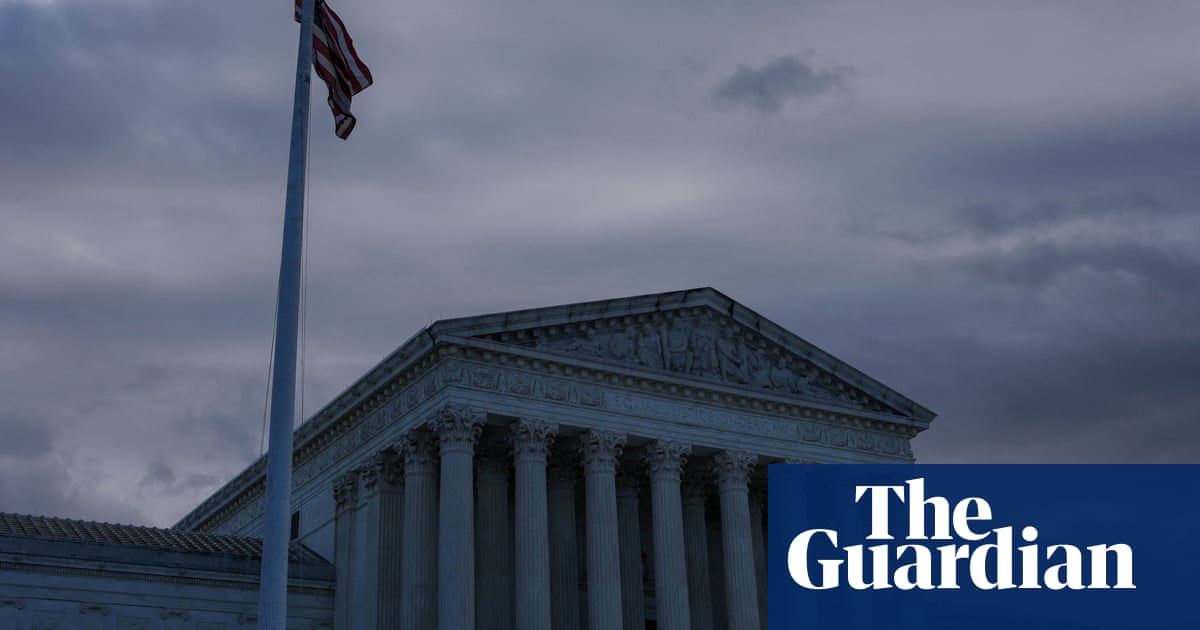Donald Trump faced setbacks in the courts and Congress on Friday, as the president finished a visit to the Middle East that included stops in Saudi Arabia, Qatar and the United Arab Emirates but not Israel.
Trump posted on social media: “THE SUPREME COURT WON’T ALLOW US TO GET CRIMINALS OUT OF OUR COUNTRY!”, after the court rejected the Trump administration’s request to remove a temporary block on deportations of Venezuelans under a rarely used 18th-century wartime law.
Meanwhile, rightwing lawmakers derailed Trump’s signature legislation in the House of Representatives, preventing its passage through a key committee and throwing into question whether Republicans can coalesce around the massive bill that would extend tax cuts enacted during Trump’s first term.
Thesupreme courton Friday rejected theTrump administration’s appeal to quickly resume deportations of Venezuelans under a 227-year-old law. Over two dissenting votes, the justices acted on an emergency appeal from lawyers for Venezuelan men who have been accused of being gang members, a designation the administration says makes them eligible for rapid removal from the US under the Alien Enemies Act of 1798.
Read the full story
Lawyers for252 Venezuelans deportedby the Trump administration and imprisoned inEl Salvadorfor two months have alleged that the migrants are victims of physical and emotional “torture”.
A law firm hired by the Venezuelan government said it had been unable to visit the migrants in the mega-prison where they are locked up and are seeking “proof of life”, but have come up against a wall of silence from President Nayib Bukele’s administration and the Central American nation’s justice system.
Read the full story
At a House budget committee hearing on Friday intended to advance Donald Trump’s signature legislation, four Republican members of the far-right Freedom Caucus joined with the Democrats to block it from proceeding, arguing the legislation does not make deep enough cuts to federal spending and to programs they dislike.
The party has spent weeks negotiating a measure dubbed the “one big, beautiful bill” that would extend tax cuts enacted during Trump’s first term, fund mass deportations of undocumented immigrants and temporarily make good on his campaign promise to end the taxation of tips and overtime. To offset its costs, Republicans have proposedcuts to the federal safety net, including Medicaid and the supplemental nutrition assistance program.
Read the full story
Donald Trump has said people are starving in Gaza and the US would have the situation in the territory “taken care of” as it suffered a further wave ofintense Israeli airstrikes.
On Friday, Israel announced a major new offensive in the territory just as Trump wrapped up his tour of the Gulf region. On the final day of trip, the US president told reporters in Abu Dhabi: “We’re looking atGaza. And we’re going to get that taken care of. A lot of people are starving.”
Read the full story
Donald Trumpaccused the former FBI directorJames Comeyon Friday of calling for his assassination in a coded social media post written in seashells.
Comey has said it did not occur to him that the numbers 8647 – which he spotted spelled out in seashells on a beach, and posted on social media – could be interpreted as a call to assassinate the president, as many Trump supporters have claimed.
Read the full story
Trump angrily insulted Bruce Springsteenafter the veteran musician said the president was heading a “corrupt, incompetent and treasonous administration”.
A major military parade – which also coincides with Trump’s 79th birthday– could cost up to $45m and involve thousands of soldiers, hundreds of vehicles and dozens of warplanes and tanks.
Immigration and Customs Enforcement (Ice) effectively misled a judgein order to gain access to the homes of students it sought to arrest for their pro-Palestinian activism, attorneys say.
Catching up?Here’s what happened on15 May 2025.
